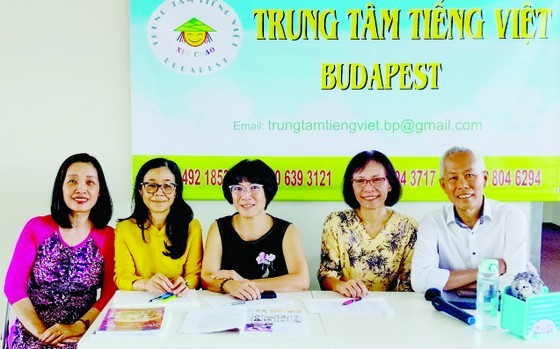 |
Mr. Tran Anh Tuan and other teachers |
At that time, Mr. Tran Anh Tuan and his wife also had a small stall in the Asian Center of Budapest but hearing Vietnamese people and their children who were born and grown up in Hungary chatting in unclear Vietnamese shopping with their parents in the Asian Center at weekends, the couple came up with that idea.
Teacher Tran Anh Tuan still remembers at that time, there were many popular models of teaching Vietnamese, but they didn't last long. He and his wife thought about organizing classes and charging reasonable tuition to proactively maintain teaching. Parents who contribute will be more responsible, their children will study more consciously, and only then will they go a long way.
Being a head of the Board of Vietnamese Businessmen in the Budapest Asian Center, Mr. Tran Anh Tuan and his peers on the representative board negotiated with the center's board of directors to borrow a classroom in the center. The first person invited to teach in June 2010 is teacher Phuong Hong who was formerly a piano teacher for Vietnamese children in Budapest. Ms. Phuong Hong also shared the same desire to find more ways for her students to approach and speak more Vietnamese. She has persistently taught until now.
From then on, every Saturday afternoon, no matter how many customers came in, Mr. Tran Anh Tuan and his wife took turns going to the fourth floor to teach students along with Ms. Phuong Hong. In that way, people shared responsibilities of teaching, finding enough students, organizing classes, people creating extracurricular activities, the Vietnamese class gradually became the Budapest Vietnamese Center in Hungary in the setting of bustling buying and selling downstairs and children make an effort to study Vietnamese upstairs.
Being originally an agricultural engineer before coming to Hungary, Mr. Tran Anh Tuan taught at the University of Nong Nghiep (Agriculture) 4 in Ho Chi Minh City. Though his prior profession is not related to teaching Vietnamese, Mr. Tuan still enthusiastically takes on the work of the Vietnamese Center in a foreign country. His feeling – a feeling of the person ‘carrying Vietnamese language across oceans’ - fit so well with Luu Quang Vu's verses that ‘Who wanders in alien countries? Does he silently speak Vietnamese every late night?’
Up to now, the important thing that has helped his work of teaching Vietnamese across the Danube River in Budapest run smoothly is to consider teaching and learning Vietnamese as one of the practical community activities, income is not the main purpose and costs are always spent on supporting other activities. Teachers are people who are qualified and reputable persons in the community and have perseverance with their love of Vietnamese.
Among the 6 teachers directly teaching class, some of them are also professors and university lecturers. The center is not opened for business purposes, the center managers always balance its own income and expenses so that it is not dependent on funding from any organization or individual.
At the beginning of this school year, 80 students enrolled in the Budapest Vietnamese Center - a very remarkable number in the community of more than 5,000 Vietnamese people residing in Hungary. In addition, the recent opening of an additional teaching center at Thang Long Trade Center has helped parents partly solve the obstacle of picking up and dropping off their children. At first, the center had to find students, parents now go to the center to register their children.
Those persistent efforts are also empowered by the attention of the Vietnamese Embassy in Hungary as well as Vietnamese organizations and associations in the foreign country.
According to the survey, children from 7 to 16 years old started learning Vietnamese abroad. After the age of 16, children tend to stop learning Vietnamese to focus on high school with many new subjects. But recently, the Budapest Vietnamese Center has opened a B1 class for students who already know Vietnamese relatively well and now want to improve their listening, speaking, reading, and writing skills in communication, drafting documents, and expanding their knowledge about Vietnamese culture.
This is a positive signal that helps expand the purpose and meaning of learning Vietnamese abroad.
























